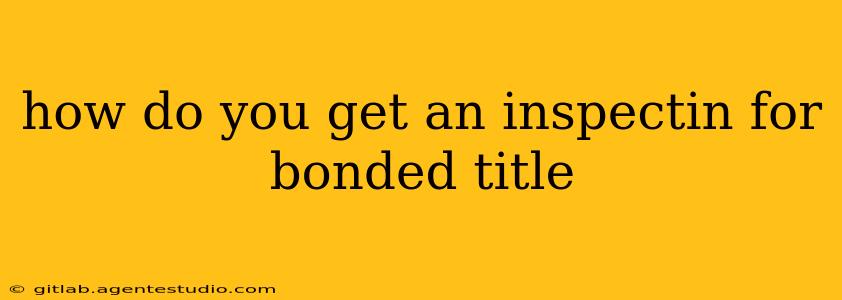Buying a car with a bonded title can be a smart way to save money, but it also comes with inherent risks. A bonded title indicates the vehicle was previously declared a total loss by an insurance company, but it's been rebuilt and is now legally drivable. Because of the vehicle's history, a thorough inspection is crucial before you purchase. This guide outlines how to get an inspection for a bonded title vehicle and what to look for.
Understanding Bonded Titles
Before diving into the inspection process, let's clarify what a bonded title means. When a vehicle suffers significant damage—often exceeding its market value—insurance companies may declare it a total loss. Instead of scrapping the vehicle, the owner might choose to repair it. To legally register the repaired vehicle, they'll need a bonded title. This title signifies that a bond has been issued to protect potential buyers from future claims related to the prior damage. However, this doesn't guarantee the vehicle is perfectly repaired or free from hidden problems.
Why a Pre-Purchase Inspection is Essential
A pre-purchase inspection (PPI) for a bonded title vehicle is non-negotiable. This professional assessment helps you identify any potential mechanical issues, hidden damage, or shoddy repair work that might not be immediately apparent. Investing in a PPI can save you from costly repairs or even a complete write-off down the line.
Finding a Qualified Inspector
Choosing the right inspector is critical. Look for mechanics with experience inspecting salvaged or rebuilt vehicles. Here's what to consider:
- ASE Certification: Look for technicians certified by the National Institute for Automotive Service Excellence (ASE). This certification demonstrates a high level of competency.
- Specialization: Some mechanics specialize in collision repair or vehicle restoration. These individuals are better equipped to spot potential problems in a rebuilt vehicle.
- Reputation: Read online reviews and ask for references. A reputable mechanic will have a strong track record and positive feedback.
- Independent Inspection: Choose an independent inspector, not one associated with the seller. This ensures an unbiased assessment.
What to Expect During the Inspection
A thorough inspection should include:
- Exterior Examination: Inspect the bodywork for signs of previous damage, mismatched paint, uneven panel gaps, or poor-quality repairs.
- Undercarriage Inspection: Check the frame and suspension for signs of bending, rust, or damage consistent with a previous accident.
- Mechanical Inspection: Inspect the engine, transmission, brakes, steering, and other critical systems. Look for signs of leaks, unusual noises, or worn parts.
- Electrical System Check: Test all lights, electrical components, and the overall electrical system.
- Documentation: Request a detailed written report outlining the inspector's findings, including photos if possible.
Asking the Right Questions
Before and during the inspection, ask the seller and inspector pointed questions:
- Details of the accident: What kind of accident occurred? What parts were replaced or repaired? Do you have photos of the damage before repair?
- Repair records: Are there detailed repair records from a reputable shop?
- Parts used: Were original manufacturer parts used in the repairs? Or were aftermarket parts used?
- Specific concerns: Bring a list of any specific concerns or areas you'd like the inspector to pay extra attention to.
Beyond the Inspection: Additional Considerations
Even with a thorough inspection, buying a bonded title vehicle is inherently riskier than buying a vehicle with a clean title. Consider these factors:
- Insurance Costs: Insurance premiums for bonded title vehicles are usually higher.
- Resale Value: Bonded title vehicles typically have lower resale value than comparable vehicles with clean titles.
- Financing: Securing financing for a bonded title vehicle can be more challenging.
Getting a pre-purchase inspection is a vital step when considering a bonded title vehicle. By following these steps, you can make an informed decision and significantly reduce the risks associated with buying a rebuilt vehicle. Remember, a thorough inspection is an investment that could save you a significant amount of money in the long run.

